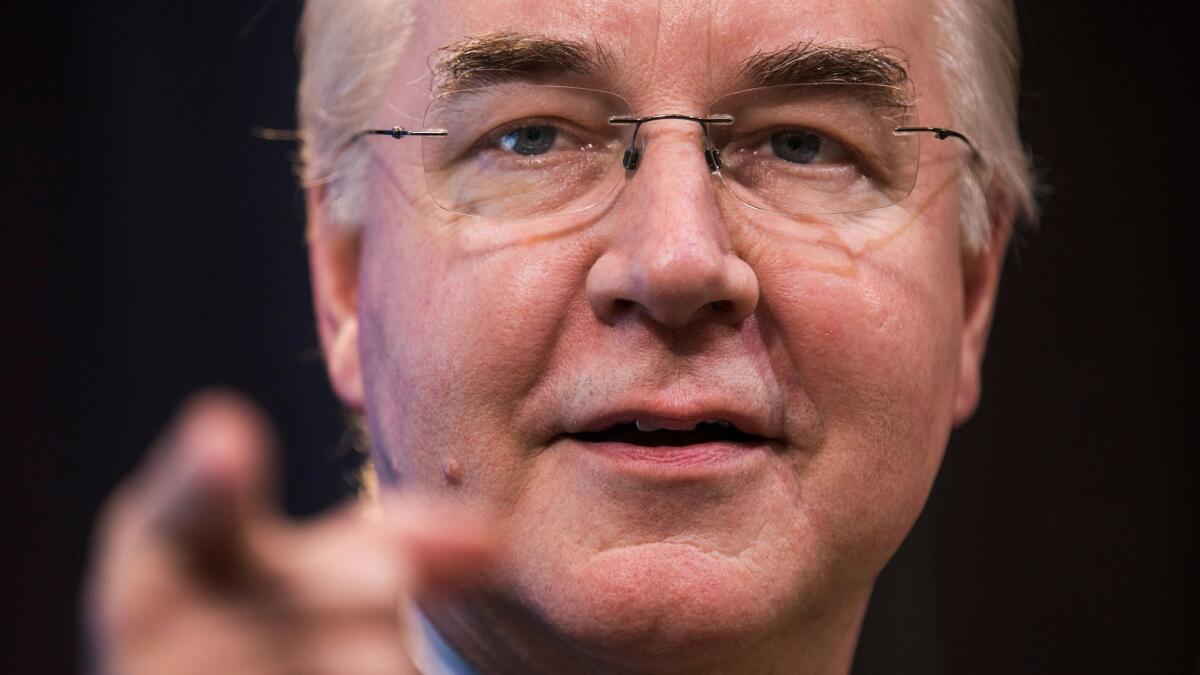Column: How repealing Obamacare could bring disaster to people with pre-existing medical conditions

Critics of the Affordable Care Act love to bathe the pre-Obamacare period in a golden glow, as if everyone just adored their old insurance plans before the ACA mucked everything up.
That adoration doesn’t make much sense to people who tried to find coverage for their pre-existing medical conditions. They were routinely denied coverage, offered bare-bones plans at stratospheric prices or dropped from their plans when they fell ill. The consequences of returning to that world would be dire for millions of Americans with such conditions, as a recent paper from the Kaiser Family Foundation reminds us. Its report, which complements a survey from Georgetown University that we reported on earlier this month, is timely indeed.
A few preliminary points: Even most Republicans who are determined to repeal the Affordable Care Act recognize that a ban on “medical underwriting” — that’s when insurers judge your eligibility for coverage or set your premium based on your medical history — is essential.
To what extent people with pre-existing health conditions are protected is likely to be a central issue in the debate over repealing and replacing the ACA.
— Kaiser Family Foundation
This protection for people with pre-existing conditions also happens to be one provision of the ACA that can’t be repealed with a simple majority vote, which means that any move in that direction would be subject to a filibuster in the Senate. In any case, the provision is one of the most popular aspects of Obamacare; it’s favored by 69% of the respondents to a recent Kaiser Family Foundation tracking poll, including 65% of Republicans.
But the ban on medical underwriting also is the provision that makes Obamacare’s least popular provision — the individual mandate — essential. Put simply, if insurers are required to sell coverage to all applicants at roughly the same price, then everyone must be required to buy coverage. The alternative is that people would buy insurance only after they became ill, and that would bankrupt the insurance industry.
A key question is what form the requirement should take. The ACA’s individual mandate effectively imposes a fine on those who go uncovered; it hasn’t worked as well as it should to draw younger and healthier people into the market because the fine has been set too low to act as an effective incentive.
The current crop of GOP proposals generally replaces the individual mandate with a different incentive: It bans medical underwriting of anyone who has maintained “continuous coverage” — that is, haven’t let their coverage lapse.
Some commentators think that’s just as good as the individual mandate. Andrew Sprung of Xpostfactoid argues that “the change need not be too disruptive … if done right.” But he acknowledges that “doing it right” could be expensive — since the primary reason people let their insurance lapse is because they can’t afford it, a default plan would have to be available at rock-bottom cost, which means a government subsidy of some sort.
Still, if congressional Republicans are as resolute as they say to repeal Obamacare, the medical underwriting ban may have to go, or at least be seriously eroded. “To what extent people with pre-existing health conditions are protected is likely to be a central issue in the debate over repealing and replacing the ACA,” the Kaiser Family Foundation observes.
The foundation estimates that about 52 million Americans younger than 65 have conditions that would have made them uninsurable if they sought coverage in the pre-ACA market. Most are covered today by employers or public programs such as Medicaid, which don’t allow medical underwriting. But many may have to resort to the individual market now and then, such as when they’re between jobs or after a divorce.
In some states, such as West Virginia, Mississippi and Kentucky, one-third or more of the residents have a “declinable condition,” the Kaiser foundation found. In big states, the number of vulnerable residents is huge: 5.9 million in California, 4.5 million in Texas and 3.1 million in Florida.
The list of conditions that insurers refused to cover pre-ACA includes cancer, heart disease, HIV, arthritis, epilepsy, sleep apnea, diabetes, obesity and transsexualism. Insurers also kept lists of ineligible occupations or activities that could warrant refusing coverage to an applicant, either because of inherent dangers or on-the-job stress. The blacklist included air traffic controllers, pilots, minders, taxi drivers, window washers, hang gliders and scuba divers.
For these and other reasons, a Kaiser Family Foundation survey determined in 2013, at least 18% of applicants in the individual market were rejected before the ACA protections kicked in. This may have underestimated the effect of medical underwriting, the foundation observed, because many people with serious conditions may not have bothered to apply, knowing they’d be rejected.
Medical underwriting had effects other than simple rejection. Applicants could be offered coverage at a much higher premium or with a higher deductible. Some could get insurance that specifically excluded their condition. In a 2000 field test, the Kaiser foundation submitted 60 applications for a hypothetical customer with “seasonal allergies,” or hay fever. The applicant was offered standard coverage from only three companies, while receiving five rejections, and offers of 46 plans with exclusion riders and six with surcharged premiums.
As The Times documented in 2006, medical underwriting also prompted insurance companies to hunt for inconsistencies or omissions in applications from customers who later developed expensive conditions. Any they found could be cited as grounds for canceling a policy retroactively.
These practices were effectively wiped out by the Affordable Care Act. What’s clear from opinion polls is that the American public considers this protection to be of paramount importance. What isn’t so clear is whether our political leaders are listening.
Keep up to date with Michael Hiltzik. Follow @hiltzikm on Twitter, see his Facebook page, or email [email protected].
Return to Michael Hiltzik’s blog.







